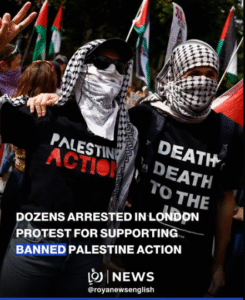Dozens of protesters were arrested in central London after demonstrating in support of Palestine Action, a direct-action group recently banned under the UK Terrorism Act. The arrests took place near Parliament Square, where demonstrators gathered for a silent vigil, many holding placards that read, “I oppose genocide. I support Palestine Action.” The protest was organized by Defend Our Juries and included a diverse group of supporters—among them healthcare workers, academics, and clergy.
Palestine Action was officially proscribed as a terrorist organization just hours before the demonstration, following its involvement in recent high-profile disruptions, including damaging military aircraft at RAF Brize Norton. The UK government stated that the group’s tactics, which involve direct action and property damage to protest British complicity in Israeli military activities, justified its designation. Critics argue the ban is a dangerous escalation that conflates peaceful protest with terrorism.
Metropolitan Police officers, citing the newly enforced ban, arrested 29 individuals under Section 13 of the Terrorism Act, which prohibits expressions of support for proscribed organizations. Video footage showed police surrounding demonstrators and making arrests calmly but swiftly. Those detained included an 83-year-old reverend, a retired professor, and a number of young activists. They were taken into custody for publicly displaying messages interpreted as support for the banned group.
The protest was peaceful and nonviolent. Participants stood quietly, many in black clothing, holding signs or wearing badges of support. Organizers said their goal was to resist the criminalization of political dissent and to express solidarity with Palestine Action’s mission of disrupting what they call Britain’s role in Israeli aggression against Palestinians.
Human rights lawyers, civil liberties organizations, and United Nations experts have strongly criticized the UK government’s move to classify Palestine Action as a terrorist group. They argue it sets a dangerous precedent and could open the door to criminalizing other protest movements, especially those engaging in civil disobedience. Legal observers also noted the lack of transparency in the government’s decision-making and the absence of public consultation.
In response to the arrests, campaigners vowed to continue organizing and resisting what they see as authoritarian overreach. Tim Crosland of Defend Our Juries called the crackdown “chilling” and said it marked a shift toward criminalizing political beliefs. Reverend Sue Parfitt, arrested at the protest, said the new law threatens basic freedoms and undermines democracy.
The Home Office, however, defended the ban, saying it was necessary to protect public safety and national security. Officials cited repeated incidents of damage to government and private property as justification for treating the group as extremist.
As legal challenges mount and public outrage grows, the arrests have ignited a national debate over freedom of expression, protest rights, and the power of the state to label dissent as terrorism. For many, the events in London mark a pivotal moment in the UK’s approach to political activism.


